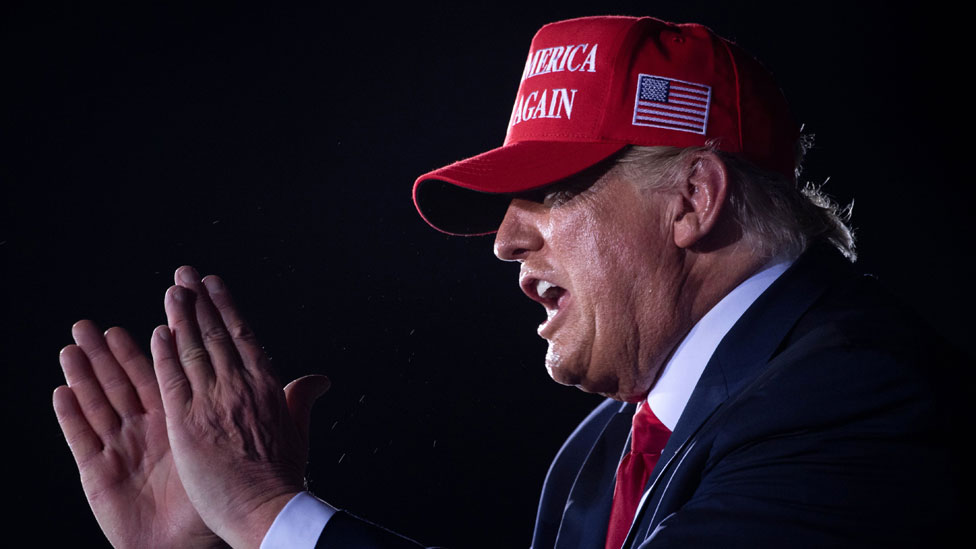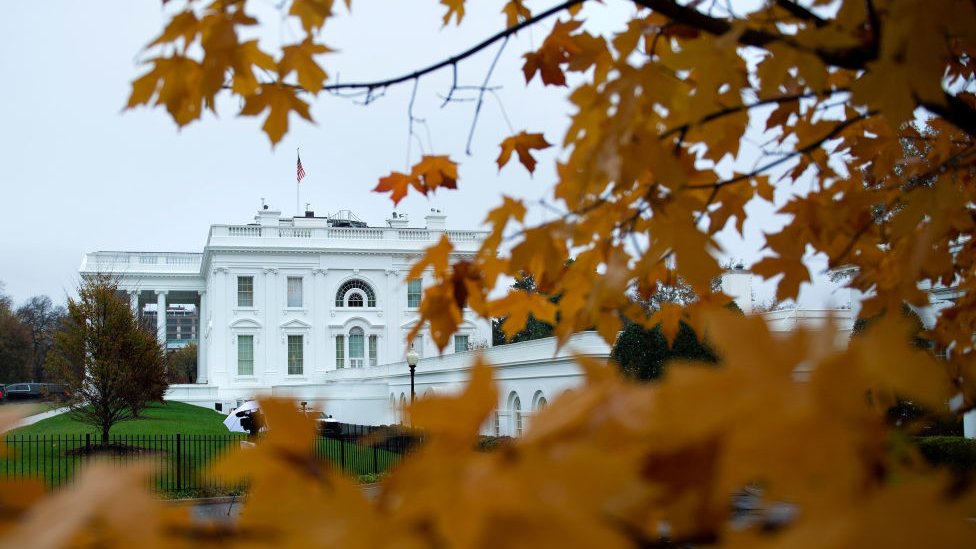
The president's legal strategy to challenge the election results seems to be falling on deaf ears in courtrooms across the country. Trump's team has yet to notch a meaningful victory, or present evidence of widespread voter fraud, after filing dozens of lawsuits.
His top lawyer, former New York City mayor Rudy Giuliani, said on Thursday that the campaign was dropping its legal challenges in Michigan, which Biden won by more than 160,000 votes.
In Georgia, the state has certified its election tabulations, which give Biden just over a 12,000 vote lead after the state conducted a hand recount of nearly 5 million ballots.
As doors to remaining in office slam shut, the president appears to be shifting strategies for flipping the election results from a longshot legal one to a longer-shot political gambit.
A step-by-step guide to Trump's strategy
Here's what he may hope to do:
- Block the vote-certification process in as many states as possible, either through lawsuits or by encouraging Republican officials to object
- Convince Republican-controlled legislatures in states Biden narrowly won to dismiss the results of the popular vote as corrupted by widespread fraud
- Have the legislature then award their state's Electoral College votes, which are cast by "electors" on 14 December, to Trump instead of Biden
- Do that in enough states - Wisconsin, Michigan and Pennsylvania, for instance - to pull Trump from his current total of 232 electoral votes past the winning 269-vote mark
- Even pulling Biden from 306 votes might work, because then the election would be decided in the House of Representatives, where even though it's controlled by the Democrats, Trump would have an advantage due to some arcane rules
What is Trump doing to make this happen?
He's applying pressure on people who can potentially change who the states pick for president.
When Americans vote in a presidential election, they are actually voting in a state contest, not a national one. They are voting for state electors who will then cast one vote each for president. These electors usually follow the will of the electorate - in Michigan, for instance, they should all vote for Joe Biden because he won the state.
On Monday, a state canvassing board made up of two Republicans and two Democrats is due to meet to count the votes and officially confirm the 16 electors' votes going to Biden.
The first hint that Trump was applying pressure to individual states to disregard their current vote totals came following reports that he had called Republican officials who had initially refused to certify the election results from Detroit, Michigan's largest city.
That two low-level party officials, among thousands of county canvassers across the US, would speak directly to a US president was more than just a little unusual. They ultimately reversed their decision to block the proceedings - and then, after Trump's call, expressed regret for reversing themselves.
Those hints became clear evidence of intent when the Republican leaders in the Michigan legislature accepted a presidential invitation to visit the White House on Friday.

The news has been accompanied by reports that the president is intent on finding other ways he can pressure key state legislatures to review, and perhaps reverse, their election results.
What is typically a mere formality during normal elections - the bipartisan certification of state vote totals - has become the latest battleground in the president's attempts to maintain power for the next four years.
Could Trump actually be successful?
It's not impossible, but the chances are very, very slim. First of all, the president would have to overturn the results in multiple states, where Biden's leads range from tens of thousands of votes to more than a hundred thousand. This isn't 2000, when everything came down just to Florida.
What's more, many of the states Trump's legal team is targeting - Michigan, Wisconsin, Pennsylvania and Nevada - have Democratic governors who are not going to sit idly by while all of this takes place.
In Michigan, for instance, Governor Gretchen Whitmer could fire the current state election board and replace it with one willing to certify Biden's victory.
Democratic governors could respond by naming their own slate of pro-Biden electors to compete with ones a Republican legislature choose, leaving it to Congress to decide which group to acknowledge.
That doesn't mean Biden's supporters aren't worried, however. While the odds of this happening are along the lines of the earth being hit by a giant meteor or someone getting struck by lightning while winning the lottery, having victory snatched away at this point would be such a cataclysmic political event that the remote prospect of such a possibility is enough to give Democrats cold sweats.
Is this strategy even legal?
Trump has spent much of his time in the White House shattering presidential norms and traditions. It appears that the last days of his term will be no different.
Just because the pressure Trump is putting on election officials and state legislatures is unprecedented or controversial, however, doesn't necessarily mean it is illegal.
In the early days of the nation, state legislatures had broad powers of how they allocated their electoral votes, and there is still no constitutional requirement that they heed the results of a popular vote. They have since circumscribed those powers by assigning their votes based on the results of popular elections, but the underpinnings of the original system still remain intact.
If the president succeeds in convincing a legislature, such as Michigan's, to act, Democrats are sure to mount legal objections. The law, both national and in each state, is fuzzy, given that this sort of thing has seldom been subject litigation.
Could states retroactively change the laws governing how they run their elections? Perhaps. But it would be up to judges to render the final verdict.
Has anyone tried this before?
The last time a closely contested election involved a battle over electors was in 2000 between Al Gore and George W Bush. That was a fight in one state, Florida, where the difference between the candidates was just a few hundred votes. Eventually, the US Supreme Court stepped in and halted any further review - and Bush became president.
For a disputed election involving multiple states you have to go back to the 1876 race between Republican Rutherford B Hayes and Democrat Samuel Tildon.
In that episode, contested results in Louisiana, South Carolina and Florida meant no candidate was able to win a majority in the Electoral College. The deadlock threw the election to the US House of Representatives, which ultimately sided with Hayes, who like Bush in 2000 and Trump in 2016, won fewer votes nationally than his defeated opponent.
What happens if Donald Trump refuses to leave office?
If the president's longshot attempts at reversing the election results fail, at 12:01 pm on 20 January Joe Biden will be sworn in as the 46th US president whether Trump formally concedes or not.
At that point, the Secret Service and the US military are free to treat the former president the way they do any unauthorised individual on government property.
"It's outrageous what he's doing," Biden said in a press conference on Thursday. "Incredibly damaging messages are being sent to the rest of the world about how democracy functions."
Even if the president isn't successful, his seeming scorched-earth strategy of contesting the election results is setting a precedent for elections to come and, according to polls, undermining the faith many Americans have in the US democratic systems and institutions.
"results" - Google News
November 21, 2020 at 04:32AM
https://ift.tt/35TV2OJ
Can Trump overturn the election result? - BBC News
"results" - Google News
https://ift.tt/2SvRPxx
https://ift.tt/2Wp5bNh
Bagikan Berita Ini















0 Response to "Can Trump overturn the election result? - BBC News"
Post a Comment